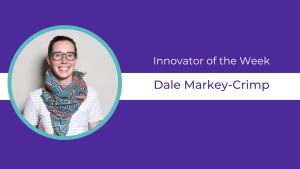Using data to deliver results for Issaquah residents

Title: Management analyst
City: Issaquah, Wash.
Residents in smaller cities still expect their city halls to deliver results — and data-driven planning and goal setting is one way to even the playing field.
In Issaquah, Wash., a city of just under 40,000 people, management analyst Dale Markey-Crimp says residents want the same level of competence and innovation from city officials as their larger neighbors.
“We sit next to the homes of Microsoft and Google, but we're not Bellevue and we're not Kirkland and we're not Seattle,” Markey-Crimp says. “But our residents want the same level of service and agility as the residents in those cities. And that really motivates us to work hard.”
Markey-Crimp joined the city in 2021 to help bring more cohesion to the its somewhat scattershot data policies, as well as taking a leading role in Issaquah’s participation in the What Works Cities Certification process.
What Works Cities Certification is the standard of excellence for what data-driven, well-managed local government looks like. Launched in 2017 by Bloomberg Philanthropies and led by Results for America, the program assesses how well cities are using data to deliver results, recognizes those who are leaders, and offers support and assistance to help cities improve. Currently, 55 cities have achieved certification.
“I think data-driven decision making has always been an undercurrent, just given the passions and interests of our council and our mayor,” Markey-Crimp says. “But I think we're finally making more of an outward commitment and we're starting to put some of the practices in place around truly setting goals and then using that to improve our services.”
Some initial areas of focus have been creating a set of performance measures across the breadth of city services and aligning those to Issaquah’s strategic plan as well as establishing public-facing data dashboards for the city’s homeless outreach and community court programs.
Markey-Crimp says that one of the advantages of being in a small city is that she’s plugged into the overall budget cycle and can more easily see which programs might be good targets for enhanced data policies. “It's a lot easier for me to know what's going on in all of our departments because I sit within our finance department and do touch part of the budget process. I'm pretty aware of what the big budget requests are that are coming through. If a team is asking for a particular increase in funding for a new initiative, that puts it on my radar.”
She said the push for What Works Cities certification has been a helpful motivator for her colleagues and that Issaquah is now hoping to have a full open data portal available for residents by the end of the year.
“Our council is really excited about the certification process. Our mayor is really excited. And I think having a pathway is the thing that is getting people more bought in,” Markey-Crimp says. “Issaquah has always been a small city that seeks to punch above its weight.”
Pro tip: “Find your data-inclined coworkers — find the people that are already thinking about these things.”


